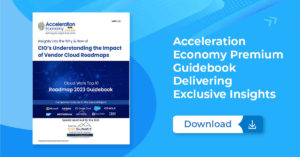
Back in February, we reported on the expanded capabilities of Salesforce’s Net Zero Cloud, which included an environmental, social, and governance (ESG) reporting module.
An update to the sustainability management application, launched at Salesforce’s recent World Tour, enables automated report building in line with the International Financial Reporting Standards (IFRS) Foundation’s standards for sustainability reporting.
The Sustainability Accounting Standards Board (SASB) Report Builder feature enables organizations to automate the disclosure of critical ESG data within a framework that organizations across sectors have widely adopted.
Gain insight into the way Bob Evans builds and updates the Cloud Wars Top 10 ranking, as well as how C-suite executives use the list to inform strategic cloud purchase decisions. That’s available exclusively through the Acceleration Economy Cloud Wars Top 10 Course.
SASB Standards focus on disclosures around the risks and opportunities determined by sustainability practices that could have a financial impact in terms of cash flow, access to funds, or the cost of capital. The framework is used by over 870 organizations from the S&P Global 1200 Index.
What the SASB Report Builder Does
ESG reporting can be challenging. This is due to the complexities of different reporting standards and an inability to trust the quality of the data supplied for reports. With the introduction of the SASB Report Builder, Net Zero Cloud users will be able to streamline the report-building process.
“Expanding Net Zero Cloud with the SASB Report Builder is a significant next step toward helping organizations automate and streamline their ESG reporting process,” said Ari Alexander, VP and GM, Salesforce Net Zero Cloud.
The new features track ESG data in line with the SASB Standards. Doing so enables users to build actionable reports using a framework supported by the IFRS Foundation’s International Sustainability Standards Board (ISSB). Ultimately, the SASB Report Builder makes it easier for companies to develop industry-specific reports that can be trusted. And that’s the key.
“We are very pleased to see Salesforce’s use of SASB Standards. By integrating industry-based standards into the Net Zero Cloud platform, SASB Report Builder can help companies monitor, manage, and report the sustainability-related risks and opportunities relevant to their industry,” explained Nicolai Lundy, IFRS Foundation’s Chief of Market Relationships, in a statement about the latest release.
Who Benefits?
The new feature will benefit Net Zero Cloud users primarily across the consumer goods, financial services, technology, and communications sectors. Salesforce has identified 14 industries within these sectors that can generate ESG reports using the SASB Report Builder.
As noted above, SASB Report Builder is a continuation of Salesforce’s mission to streamline ESG reporting. It builds on the company’s existing Automate ESG Reporting application. Alexander noted that Salesforce intends to utilize generative artificial intelligence (AI) to drive further reporting efficiency; Net Zero Cloud already uses AI for forecasting and visualization purposes.
Closing Thoughts
Today, ESG regulations are expanding in various jurisdictions globally, so companies must stay ahead of the curve to ensure their reports are timely and accurate. Sustainability goals are increasingly developed in unison with regulatory requirements, so companies are also weaving in compliance while developing a strategy that supports the expectations of customers and investment partners.
Yet, these commitments aren’t always easy to achieve; they can require significant time and financial investment. That’s why Salesforce’s ongoing developments within its Net Zero Cloud are so important: they enable customers to continue to control costs and drive efficiency.










